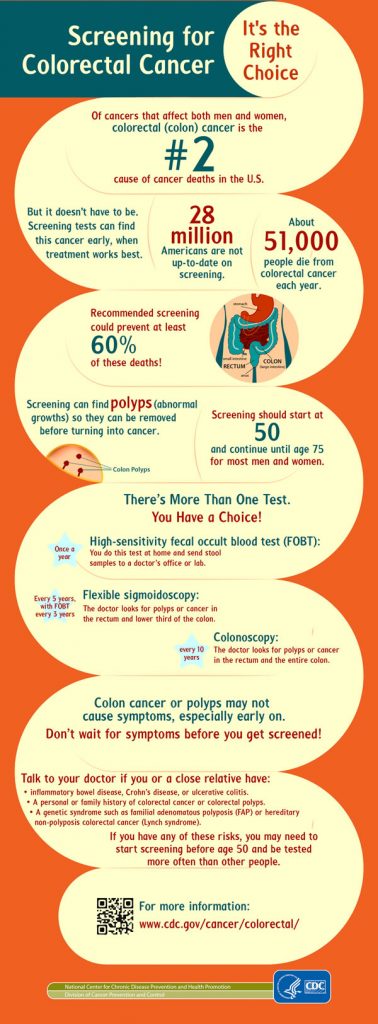News & Events
Get Your Screening For Colon Cancer
Get Your Screening For Colon Cancer
With colorectal cancer having the second highest death rate after lung cancer, there should  be no reason why you shouldn’t want to get tested. There are many reasons why people don’t, or flat out refuse to do so, but it’s better off in the long run to know your status than continue living with the fear of the unknown.
be no reason why you shouldn’t want to get tested. There are many reasons why people don’t, or flat out refuse to do so, but it’s better off in the long run to know your status than continue living with the fear of the unknown.
Early detection is critical, and once men and women reach the age of 50, they should get screened for signs of colon cancer. If you have a family history of colon cancer, you should get tested earlier. By catching it in its early stages, treatment can be easier versus treatment when it’s full blown. Here’s why and how you can screen for colon cancer to save a loved one’s life, or even yours.
There are two types of tests to consider. The first are tests that detect cancer and poly cancerous tissue, known as polyps, inside of your colon. These include the following:
- Flexible sigmoidoscopy
- Colonoscopy
- Double-contrast barium enema
- CT colonography – also known as a virtual colonoscopy
These tests are to be done every five years, except for a colonoscopy, which can be done every ten years, or done if cancer is found in your colon.
The second type of tests are tests that only detect cancer. These tests sample your stool to look for blood that will give the doctors an indicator that cancer cells are growing in your body. These include:
- Guaiac-based fecal occult blood tests
- Fecal immunochemical tests
- Stool DNA tests
These tests are to be taken every year except for the stool DNA test, which doctors recommend being done every three years.
We know, the idea of screening for colon cancer can make people uncomfortable, but it can make the difference between saving your life or having cancer. Not only is it beneficial for you to be aware of your health, but it’s also important to stress it to your family members as well. It can be hard to tell family members, especially parents, what to do, but be supportive of them and volunteer to take them to appointments and be their ride after taking a test. Their anger and irritability might be a mask for their fear.
At Gastrointestinal Specialists, we strive to make you as comfortable as possible with your procedure. We offer a variety of services for your convenience, so be sure to schedule your procedure with us today.